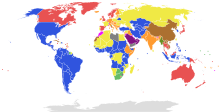Parliamentary monarchy
The parliamentary monarchy is a form of government with a representative system in which the king exercises the function of head of state under the control of the legislative branch (parliament) and the executive branch (government). The rules and decisions issued by Parliament regulate not only the functioning of the State but also the performance and functions of the king himself.
It is very common, even in the political science bibliography, to identify it with another type of monarchy, the constitutional monarchy. Although the latter has a very different characteristic, and that is that it allows a greater capacity and functions to be reserved for the king, who retains a large part of the power, for example, controlling the executive branch.
In most of the current parliamentary monarchies, the autonomy and powers of the monarch are very limited and curtailed, and Parliament can make decisions at any time that force the King to comply with them. The exceptions to these general limitations are pure historical reminiscences that are maintained by tradition in some older monarchies, although they normally refer to issues of little importance to the political life of the country. Effective decision-making remains in the Government and in the different chambers of parliamentary representation, which in a parliamentary monarchy are considered the depositaries of popular sovereignty.
In this type of political system, the monarch sanctions the laws and decrees that are presented to him to sign by the Government and Parliament.
It is usual in a parliamentary monarchy for the monarch to enjoy privileges based on his role as the highest representative of the country and head of state. These privileges usually refer not only to the economic maintenance of the royal family and its security, but also to issues of legal immunity, etc., which affect one of the main representative bodies of the State and are usually regulated by a constitution or a similar norm. fundamental in law.
Contenido relacionado
Saint Morales
Security wall
Constitutional Court

